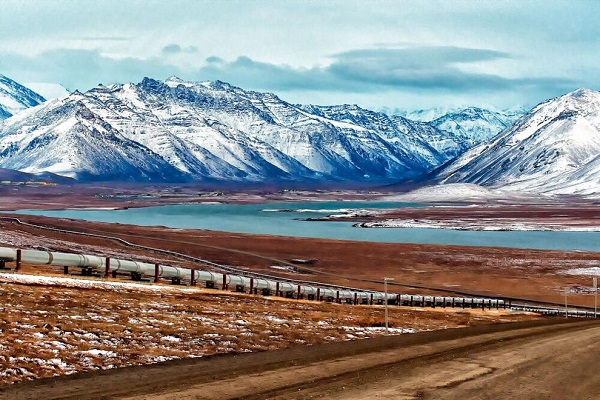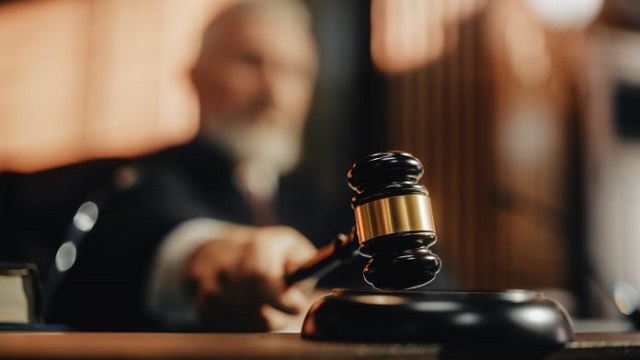International
Ghislaine Maxwell to be sentenced in Epstein sex abuse case

NEW YORK (AP) — Ghislaine Maxwell, the jet-setting socialite who once consorted with royals, presidents and billionaires, is set to be sentenced Tuesday for helping the wealthy financier Jeffrey Epstein sexually abuse underage girls.
The 11 a.m. sentencing in New York is the culmination of a prosecution that detailed how the power couple flaunted their riches and prominent connections to lure vulnerable girls as young as 14, and then exploit them.
Prosecutors said Epstein, who killed himself in 2019 while awaiting trial, sexually abused children hundreds of times over more than a decade, and couldn’t have done so without the help of Maxwell, his longtime companion and onetime girlfriend.
“Maxwell’s conduct was shockingly predatory. She was a calculating, sophisticated, and dangerous criminal who preyed on vulnerable young girls and groomed them for sexual abuse,” prosecutors wrote in a court filing.
In December, a jury convicted Maxwell of sex trafficking, transporting a minor to participate in illegal sex acts and two conspiracy charges. Prosecutors say she deserves 30 to 55 years in prison.
Maxwell, 60, has denied abusing anyone. Her lawyers have asked U.S. District Judge Alison J. Nathan to impose a sentence of no more than five years.
“The witnesses at trial testified about Ms. Maxwell’s facilitation of Epstein’s abuse, but Epstein was always the central figure: Epstein was the mastermind, Epstein was the principal abuser, and Epstein orchestrated the crimes for his personal gratification,” they wrote in a court filing.
Epstein and Maxwell’s associations with some of the world’s most famous people were not a prominent part of the trial, but mentions of friends like Bill Clinton, Donald Trump and Britain’s Prince Andrew showed how the pair exploited their connections to impress their prey.
Over the past 17 years, scores of women have accused Epstein of abusing them. Many described Maxwell as acting as a madam who recruited them to give massages to Epstein.
The trial, though, revolved around allegations from only a handful of those women.
Four testified that they were abused as teens in the 1990s and early 2000s at Epstein’s mansions in Florida, New York, New Mexico and the Virgin Islands.
Three were identified in court only by their first names or pseudonyms to protect their privacy: Jane, a television actress; Kate, an ex-model from the U.K.; and Carolyn, now a mom recovering from drug addiction. The fourth was Annie Farmer, who identified herself in court by her real name after speaking out publicly.
They described how Maxwell charmed them with conversation and gifts and promises that Epstein could use his wealth and connections to help fulfill their dreams.
Then, they testified, she led them to give massages to Epstein that turned sexual and played it off as normal.
Carolyn testified that she was one of several underprivileged teens who lived near Epstein’s Florida home in the early 2000s and took up an offer to massage him in exchange for $100 bills in what prosecutors described as “a pyramid of abuse.”
Maxwell made all the arrangements, Carolyn told the jury, even though she knew the girl was only 14 at the time.
The allegations against Epstein first surfaced publicly in 2005. He pleaded guilty to sex charges in Florida and served 13 months in jail, much of it in a work-release program as part of a deal criticized as lenient. Afterward, he was required to register as a sex offender.
In the years that followed, many women sued Epstein over alleged abuse. One, Virginia Giuffre, claimed that Epstein and Maxwell had also pressured her into sexual trysts with other powerful men, including Prince Andrew. All of those men denied the allegations and Giuffre ultimately settled a lawsuit against Andrew out of court.
Federal prosecutors in New York revived the case against Epstein after stories by the Miami Herald in 2018 brought new attention to his crimes. He was arrested in 2019, but killed himself a month later.
Eleven months later after his death, Maxwell was arrested at a New Hampshire estate. A U.S., British and French citizen, she has remained in a federal jail in New York City since then as her lawyers repeatedly criticize her treatment, saying she was even unjustly placed under suicide watch days before sentencing. Prosecutors say the claims about the jail are exaggerated and that Maxwell has been treated better than other prisoners.
Her lawyers also fought to have her conviction tossed on the grounds of juror misconduct.
Days after the verdict, one juror gave media interviews in which he disclosed he had been sexually abused as a child — something he hadn’t told the court during jury selection. Maxwell’s lawyers said she deserved a new trial. A judge disagreed.
At least eight women have submitted letters to the judge, describing the sexual abuse they said they endured for having met Maxwell and Epstein. Four of them plan to make oral statements at sentencing, including two women — Annie Farmer and Kate — who testified at the trial.
In letters to the judge, six of Maxwell’s seven living siblings pleaded for leniency.
Anne Holve and Philip Maxwell, her eldest siblings, wrote that her relationship with Epstein began soon after the 1991 death of their father, the British newspaper magnate Robert Maxwell.
They said Robert Maxwell had subjected her daughter to “frequent rapid mood swings, huge rages and rejections.”
“This led her to becoming very vulnerable to abusive and powerful men who would be able to take advantage of her innate good nature,” they wrote.
Prosecutors called Maxwell’s shifting of blame to Epstein “absurd and offensive.”
“Maxwell was an adult who made her own choices,” they wrote to the court. “She made the choice to sexually exploit numerous underage girls. She made the choice to conspire with Epstein for years, working as partners in crime and causing devastating harm to vulnerable victims. She should be held accountable for her disturbing role in an extensive child exploitation scheme.”
Larry Neumeister And Tom Hays, The Associated Press
Energy
Houses passes bill to protect domestic oil production, protect Iñupiat community

From T
Indigenous communities are advocating for economic development projects in the North Slope, explaining that more than 95% of their tax base comes from resource development infrastructure.
The U.S. House passed another a bill to advance domestic energy production, this time in response to cries for help from an indigenous community living in the Alaska North Slope.
The bill’s cosponsor, a Democrat from Alaska, did not vote for her own bill. It passed with the support of five Democrats, including two from Texas who are strong supporters of the U.S. oil and natural gas industry.
The U.S. House has advanced several bills and resolutions to support domestic U.S. oil and natural gas production, supported by Texas Democrats. They’ve done so after the Biden administration has taken more than 200 actions against the industry, The Center Square reported.
One includes the Department of the Interior restricting development on over 50% of the Arctic National Wildlife Refuge (ANWR), directly impacting the Iñupiat North Slope community.
The Alaska North Slope region includes a part of ANWR and National Petroleum Reserve-Alaska (NPRA). Both are home to the indigenous Iñupiat community who maintain that the Biden administration is trying to “silence indigenous voices in the Arctic.”
The plan to halt North Slope production was done through a federal agency rule change, a tactic the administration has used to change federal law bypassing Congress. The rule cancels seven oil and gas leases issued by the Trump administration in the name of “climate change.” Interior Secretary Deb Haaland said canceling the leases was “based on the best available science and in recognition of the Indigenous Knowledge of the original stewards of this area, to safeguard our public lands for future generations.”
The indigenous community strongly disagrees, saying they weren’t consulted before, during or after the rule change.
Nagruk Harcharek, president of the Voice of Arctic Iñupiat, a nonprofit that represents a collective elected Iñupiaq leadership, says the administration’s mandate “to ‘protect’ 13 million acres of our ancestral homelands was made without fulfilling legal consultative obligations to our regional tribal governments, without engaging our communities about the decision’s impact, and with an incomplete economic analysis that undercuts North Slope communities.”
He argues the administration has overlooked “the legitimate concerns of elected Indigenous leaders from Alaska’s North Slope. This is a continuation of the onslaught of being blindsided by the federal government about unilateral decisions affecting our homelands.”
Restricting NPR-A oil production is “yet another blow to our right to self-determination in our ancestral homelands, which we have stewarded for over 10,000 years. Not a single organization or elected leader on the North Slope, which fully encompasses the NPR-A, supports this proposed rule,” he said, adding that they asked for it to be rescinded.
In response, U.S. Reps. Mary Sattler Peltola, D-Alaska, and Pete Stauber, R-Minn., introduced HR 6285, “Alaska’s Right to Produce Act.” The U.S. House Committee on Natural Resources Subcommittee on Energy and Natural Resources held a hearing on the issue; members of the Iñupiat Community of the Arctic Slope and the Kaktovik Iñupiat Corporation testified.
Kaktovik Iñupiat Corporation president Charles Lampe said they “refuse to become conservation refugees on our own homelands and unapologetically stand behind the Alaska’s Right to Produce Act.”
The Kaktovik is the only community located in the ANWR. The North Slope Iñupiat have stewarded their ancestral homelands for thousands of years, predating the creation of the U.S. federal government, the Interior Department and the state of Alaska, they argue.
The indigenous communities are advocating for economic development projects in the North Slope, explaining that more than 95% of their tax base comes from resource development infrastructure. Tax revenue funds public school education, health clinics, water and sewage systems, wildlife management and research and other services that otherwise would not exist, they argue. Eliminating their tax base, will directly impact their lives and jeopardize their long-term economic security, they argue.
The House passed Alaska’s Right to Produce Act on Wednesday to reverse the rule change and establish the Coastal Plain oil and gas leasing program. It authorizes and directs federal agencies to administer oil and natural gas leasing on 13 million acres of public land in the North Slope.
The bill passed by a vote of 214-199 without the support of its Democratic cosponsor from Alaska, Peltola, who voted “present.”
Five Democrats voted for it: Sanford D. Bishop, Jr. of Georgia, Henry Cuellar and Vincente Gonzalez of Texas, Jared Golden of Maine and Marie Gluesenkamp Perez of Washington. One Republican voted against it, Rep. Brian Fitzpatrick of Pennsylvania.
After it passed, Harcharek said, “Since the Biden administration announced this decision in September, our voices, which overwhelmingly reject the federal government’s decisions, have been consistently drowned out and ignored. This administration has not followed its well-documented promises to work with Indigenous people when crafting policies affecting their lands and people. We are grateful to Congress for exercising its legislative authority to correct the federal government’s hypocrisy and advance Iñupiaq self-determination in our ancestral homelands.”
Kaktovik Mayor Nathan Gordon, Jr. said the administration “is regulating our homelands in a region they do not understand and without listening to the people who live here.” The new law is “a vital corrective measure that will prevent our community from being isolated and protect our Iñupiaq culture in the long term.”
The bill heads to the Democratic controlled Senate, where it is unlikely to pass.
Automotive
Vehicle monitoring software could soon use ‘kill switch’ under the guise of ‘safety’

From LifeSiteNews
By Caryn Lipson
Ambiguity surrounds the definitions of ‘impairment’ and the consequent privacy implications of such technology, raising fears of government overreach and erosion of rights.
In the name of safety, the government has taken steps that critics say have denied citizens what used to be considered inalienable constitutional rights.
Citizens are concerned that their right to freedom of speech under the First Amendment is being denied, ostensibly, to keep citizens safe from “harmful misinformation,” and fear that the Second Amendment right to bear arms is being infringed upon to combat gun violence. Watchdogs further contend that citizens are being denied the Fifth Amendment’s protection against self-incrimination and the Sixth Amendment’s right to face one’s accuser when technology is used to gather evidence.
READ: Vietnam’s new biometric ID cards raise fears of privacy violations, data breaches
The fear now is that increased use of technology will soon mean an even greater loss of privacy and further erosion of the Fifth and Sixth Amendments, due to certain provisions in Joe Biden’s infrastructure bill which will soon become mandatory. Under the guise of keeping citizens safe by preventing drunk driving, it may amount to ceding the freedom to travel to government control.
H.R.3684 – Infrastructure Investment and Jobs Act
The infrastructure bill, HR. 3684, passed by both chambers of Congress and signed by Biden on November 15, 2021, includes a provision for several vehicle monitoring technologies to be installed in cars, which have recently or will soon be required in new vehicles, including technology to determine if a driver is drunk or impaired.
The Center for Automotive Research’s Eric Paul Dennis reviewed the bill and summarized “key sections.” Dennis, a senior transportation systems analyst, reviewed the section on “Drunk and Impaired Driving Prevention Technology” (HR 3684 Section 24220) and explained that Congress gave the NHTSA (National Highway Traffic Safety Administration) the role of determining exactly what this section means and how it will be implemented:
This provision directs NHTSA to issue a rule to require ‘advanced drunk and impaired driving prevention technology’ in new light vehicles.
- Congress tasked NHTSA with interpreting this law, including establishing the statutory meaning of ‘impaired.’
- The legislation directs NHTSA to adopt a new safety mandate by 15 November 2024 and begin enforcing it by September 2027 (at the latest) if this is feasible. [Emphases added.]
Impaired driving not defined
Others, such as Michael Satterfield, writing as The Gentleman Racer®, were more detailed in their review of the legislation. Satterfield poured through the 1,039-page infrastructure bill. He agreed that good roads, bridges, and safety are important to automotive enthusiasts, but wrote that he uncovered some concerning legislation “buried deep within HR.3684.” The legislation calls not only for changes in crash testing and advanced pedestrian crash standards but also for a “kill switch” to be standard for all new vehicles by 2026.
Satterfield explained that all new vehicles will be required to have passive monitoring systems for the driver’s behavior and an algorithm will determine if the driver is too impaired to operate the vehicle. If the algorithm decides that the driver is too impaired to operate the car, the program will have some means of taking control of the vehicle. But what constitutes impairment and what the program will actually do was not explained by the legislation, as Satterfield noted:
What is not outlined in the bill is what constitutes impairment, outside of the blood alcohol standard, how does the software determine the difference between being tired and being impaired? Passive blood alcohol testing won’t detect impairment from prescription painkillers or other narcotics.
The bill also doesn’t outline what happens when a vehicle detects a driver may be impaired other than that the system must ‘prevent or limit motor vehicle operation if an impairment is detected’ which is all well and good in a bar’s parking lot. But what will this system do if an ‘impairment is detected’ while traveling at 75 mph on the highway? [Emphasis added.]
Accused by your own car’s surveillance system
Satterfield’s greatest concern was the question of individual privacy that a vehicle that monitors the driver raises, including who will have access to the data, and other issues such as the right not to self-incriminate under the Fifth Amendment and the Sixth Amendment right to face your accuser.
He also expressed concern that most drivers will not be aware of the new technology until it affects them in some way:
Perhaps the most disturbing aspect of the legislation is the lack of detail. The main concerns expressed by many, including former U.S. Rep. Bob Barr, come down to privacy. Who will have access to the data? How long will it be stored? Will this capability be exploitable by third-party or government agencies to shut down vehicles outside of the function of preventing impaired driving?
Privacy concerns and the 5th Amendment’s right to not self-incriminate, and the 6th Amendment’s right to face one’s accuser, have already been used to challenge data collection from license plate readers and redlight cameras. Automakers have little choice but to comply with new federal mandates and the majority of consumers will likely be unaware of this new technology until it impacts them in some way. [Emphasis added.]
Freedom or control?
John Stossel recently interviewed former vintage race car driver Lauren Fix about what she believes are the implications of the soon-to-be-implemented impaired driving technology, as reported on FrontPage Magazine.
READ: High-tech cars are secretly spying on drivers, resulting in insurance rejections: NYT report
Fix pointed out that the algorithm cannot determine what exactly is happening in the car and with the driver and asks Stossel how much control over his life he is willing to give up:
Are you willing to give up every bit of control of your life? Once you give that up, you have no more freedom. This computer decides you can’t drive your vehicle. Great. Unless someone’s having a heart attack and trying to get to the hospital.
California, Fix pointed out, already requires vehicle software to limit excess speed to 10 miles over the limit, legislation about which Frontline News reported.
Fix also revealed to Stossel that some companies already collect and sell driver data and proceeded to outline further abuses that could occur as a result of computer surveillance technology, such as charging for mileage or monitoring your “carbon footprint” and deciding that you maxed out on your monthly carbon credits so you can’t drive anymore until the following month. Or perhaps the car won’t start because the software determines you may be on your way to purchase a firearm.
What about hackers?
Can hackers access a vehicle’s software and take control of someone’s car? This possibility is another worrying aspect of the infrastructure bill, which Frontline News will discuss in an upcoming report.
Reprinted with permission from America’s Frontline News.
-

 Alberta2 days ago
Alberta2 days agoOfficial statement from Premier Danielle Smith and Energy Minister Brian Jean on the start-up of the Trans Mountain Pipeline
-

 Economy2 days ago
Economy2 days agoToday’s federal government—massive spending growth and epic betting
-

 Economy2 days ago
Economy2 days agoYoung Canadians are putting off having a family due to rising cost of living, survey finds
-

 COVID-192 days ago
COVID-192 days agoCanada’s COVID vaccine injury program has paid out just 6% of claims so far
-

 Environment1 day ago
Environment1 day agoClimate Alarmists Want To Fight The Sun. What Could Possibly Go Wrong?
-

 Opinion9 hours ago
Opinion9 hours agoClimate Murder? Media Picks Up Novel Legal Theory Suggesting Big Oil Is Homicidal
-

 International2 days ago
International2 days agoNYPD storms protest-occupied Columbia building, several arrested
-

 Addictions19 hours ago
Addictions19 hours agoCity of Toronto asks Trudeau gov’t to decriminalize hard drugs despite policy’s failure in BC








